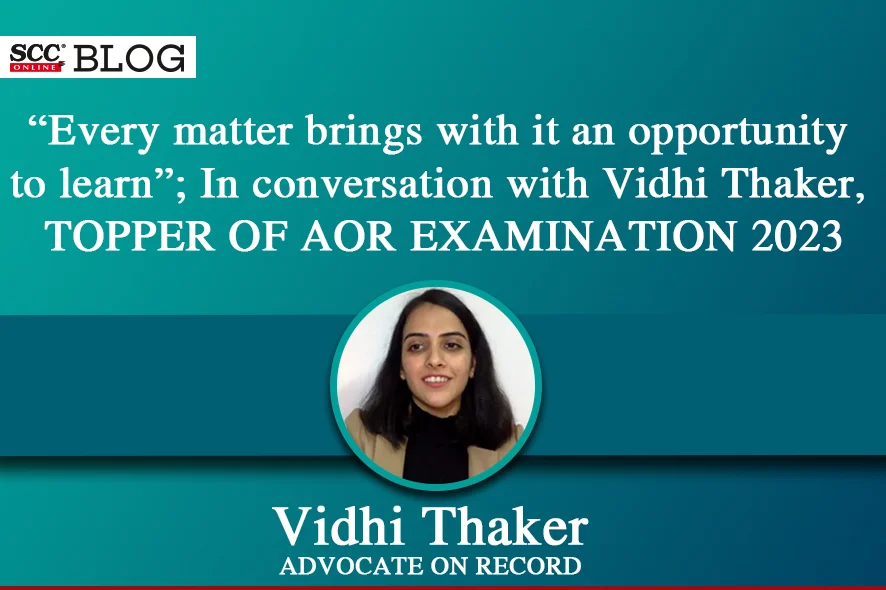Introduction
After completing her graduation in law from Pravin Gandhi College of Law in Mumbai (‘PGCL Mumbai’) in the year 2017, Ms Thaker served as Junior Counsel to Advocate Kunal Bhanage. Then, in the year 2019, she worked as the Law Clerk-cum-Research Assistant to Justice Indu Malhotra.
Recently, Ms Thaker, got enrolled as an Advocate-on-record at the Supreme Court of India, topping the charts of the AoR Examination, 2023. Here, we stole the chance to have a quick conversation with Vidhi Thaker on becoming a topper in AoR Examination 2023.
1. Could you please introduce yourself for our readers, tracing briefly your journey from law school to becoming an AoR?
I studied law at the PGCL Mumbai, which was followed by working at the Principal Bench of the Bombay High Court and other trial courts in Mumbai. After having practised in Mumbai for some time, I decided to shift to Delhi to practice at the Supreme Court of India.
Working at the Supreme Court diluted my initial hesitation of not coming from a National Law University, when I realised that, in court, the quality of your work is the only determinative factor. After I practised in Delhi for a few years, I was advised by seniors in the profession to appear for the AoR exam. Finding myself to be eligible for the exam, I appeared for the next scheduled set of tests.
2. What inspired your decision to pursue law? Did you always know that this is what you wanted to do, or was it an intuitive feeling?
I was always keen to study law. I enjoyed the idea of being presented with a problem, and developing the ability to arrive at a solution, or strategise a method to navigate it. This intrigued my interest in the subject. Personally, while working on any matter, I endeavour to identify and crystallise the legal issue involved, and present my arguments on the point lucidly.
3. How would you describe yourself as a law student?
As a student of law, I took up opportunities to participate in moot court competitions, debates and drafting competitions, both at the intra college and the national level. This helped me hone my research and drafting skills. I would also author research papers, and participate in presentations, which helped me not only present my thoughts in a structured manner, but also develop my oratory skills. I would not hesitate to ask questions to my professors at college, who were kind enough to answer them, and recommend supplementary reading material.
I have now realised that, as an advocate, one will always be a student of law. The learning in litigation, not only for preparing matters, but also observing court proceedings, is beyond comparison.
4. Please take us through your preparation for each of the components of the AoR examination. What did a typical day of preparation look like for you?
The AoR exam covers 4 subjects, they are:
(1) Practice and Procedure of the Supreme Court;
(2) Drafting;
(3) Professional Ethics; and
(4) Leading Cases.
For practice and procedure, I relied heavily on a presentation prepared by Ms Vibha Dutta Makhija, Senior Advocate. For the drafting subject, I undertook writing practice of each type of draft, covering at least one draft per day for the entire duration of my preparation. For the third paper i.e. Professional Ethics, Mr Maninder Singh, Senior Advocate prepared a very detailed note, covering all important topics with case laws. This note was extremely thorough and formed the basis of preparation for that subject. The last paper, leading cases, covers landmark judgments of the Supreme Court. Mrs V. Mohana, Senior Advocate circulated a note succinctly covering the facts, discussion and ratio of these judgments.
On a typical day of preparation, I covered at least two subjects every day, and additionally took on writing practice. I ensured that I was in a healthy mental space and took break on days I felt overwhelmed with the preparations.
5. What are your aspirations from this profession, now that you are officially enrolled as an AoR at the Supreme Court of India?
Being enrolled as an AoR is the first step of my journey towards practice at the Supreme Court. My seniors in the profession have rendered valuable advice to me, and I intend to follow their footsteps, and make a mark in the profession. I am hopeful that the future will bring opportunities for me, to not only find a place for myself as a young professional, but also contribute to the society.
6. What are the key takeaways from your journey up until being an AoR that you would want the next generation of lawyers to know and remember?
In this marathon of a profession, I have barely crossed the first few kilometres. While I am too new to the race, so far, I have learnt that consistency and unwavering work ethics yield results. Having a long-term goal is important; but it is equally necessary to perform each day’s tasks with utmost dedication. Every matter brings with it an opportunity to learn, and it is upon us to make the best of each one of those occasions.






